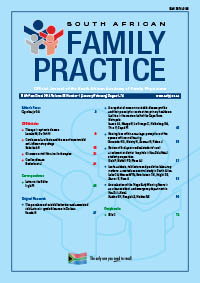Hearing loss within a marriage: perceptions of the spouse with normal hearing
Keywords:
Acquired hearing loss, Marriage, Aural rehabilitation, Communication, Relationship dynamics
Abstract
Objective: The objective of the study was to determine the perceptions of a spouse about the influence of his or her partner’s hearing loss on their relationship as it may have an impact on aural rehabilitation. Design: A descriptive survey design was utilised. A questionnaire, adapted from The Significant Other Scale for Hearing Disability was used for data collection. Subjects: Through purposive sampling, 35 individuals who reported experiencing no hearing difficulties and who were married to a person with an acquired hearing loss contributed data for this study. These data were analysed using Stata® version 9. Results: The majority of the participants identified a range of communication-related difficulties within their marriage, such as repeating themselves extensively in conversation with their hearing-impaired partners (97%), raising the volume of their voices (83%), and having to maintain face-to-face contact with their spouse (74%). These difficulties may have led to negative feelings within the marriage as during communication, 69% of participants reported feeling frustrated because of difficulties experienced in respect of their partner’s hearing impairment. Participants reported that they had to accept a hearing impairment in their marriage. Seventy-one per cent of participants expressed concern for their hearing-impaired partners, and specifically with regard to fearing for their safety, e.g. when alarms or warning bells were not heard. Conclusion: A partner’s acquired hearing impairment may lead to the development of negative feelings within a marriage. Therefore, audiologists must be aware of the perceptions of spouses with normal hearing when providing aural rehabilitation to both the hearing-impaired individuals and their partners, and thereby preventing disharmony in the marriage, while ensuring effective service delivery.
Published
2013-08-01
Section
Original Research
By submitting manuscripts to SAFP, authors of original articles are assigning copyright to the South African Academy of Family Physicians. Copyright of review articles are assigned to the Publisher, Medpharm Publications (Pty) Ltd, unless otherwise specified. Authors may use their own work after publication without written permission, provided they acknowledge the original source. Individuals and academic institutions may freely copy and distribute articles published in SAFP for educational and research purposes without obtaining permission.

